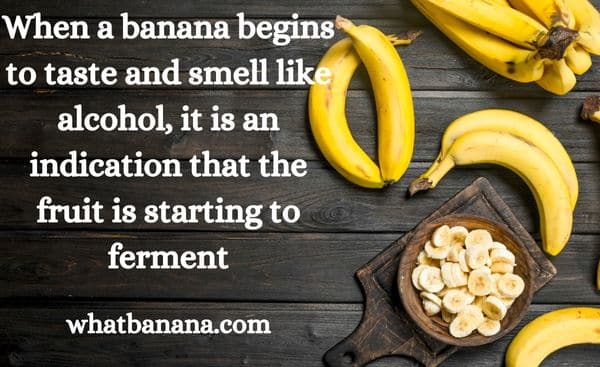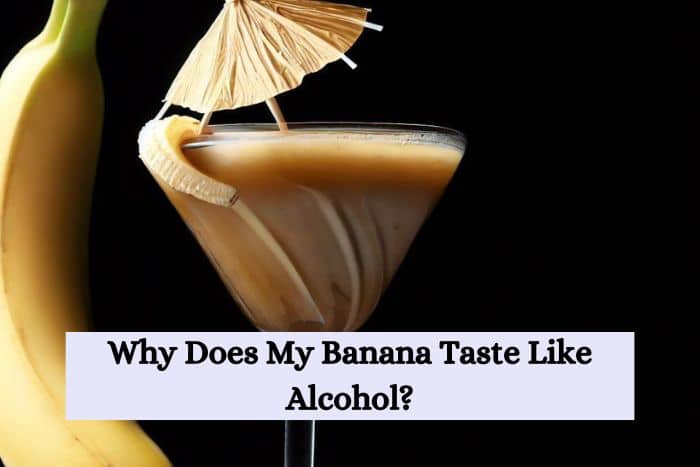When enjoying your tasty snack, have you ever thought, why does my banana taste like alcohol?
And perhaps, I would also be wondering, is it still safe to eat?
Can children eat bananas that have reached the overripe stage?
This is actually a natural part of the process as the banana ages.
A banana can go from being perfectly ripe to inedible in as little as five days.
Let’s have a look at what science has to say about the subject.
Why Does My Banana Taste Like Alcohol?
When a banana begins to taste and smell like alcohol, it is an indication that the fruit is starting to ferment. It is likely that the skin will have turned black, and the taste may be somewhat unpleasant. However, providing there is no evidence of mold or fruit flies, or other insects, it is perfectly safe to eat. The sugar in the banana is simply turning into alcohol. The amount of alcohol produced by the banana is very minimal, and it is not possible to get drunk on the fruit. As such, children can safely eat overripe bananas.
1. Can I Eat an Overripe Banana?
So, hopefully, you are now reassured that the taste of alcohol in your banana is nothing to be worried about.
The fermentation process is completely natural, and although the taste may have changed, it’s safe to eat an overripe banana.
In fact, they may taste even sweeter than normal due to the increased sugar levels.
Unfortunately, many people throw them away when they reach this stage, which leads to increased food waste.
Of course, it’s down to your personal preference as to whether the banana has gone too far and is no longer edible.
There are several stages of ripeness.
The look of the fruit will undoubtedly influence your decision, starting with the appearance of the skin.
That gorgeous yellow color begins to turn brown and eventually black in a matter of days.
Even when the skin is black, you can still peel the banana and take a look at the fruit inside.
Obviously, if it turns to mush in your hand, then that’s not a good sign!
In general, an overripe banana is safe to eat, but the increased sugar may lead to stomach upsets in some people.
If there is any obvious mold, then do be aware that this can cause respiratory problems.
At the end of the day, use your common sense!

2. What Can I Do with an Overripe Banana?
If you’re a bit squeamish about eating an overripe banana just as it is, as I would be, what else can you do with it?
The most obvious answer is to cook something with it, such as banana bread.
The softer texture and increased sweetness of the fruit are what give banana bread its moist, delicious flavor.
Overripe bananas are ideal for smoothies and shakes as they blend very easily.
Ice cream is another option and is sure to be a hit with kids!
If you don’t have any plans for using your overripe bananas, they can be safely frozen.
A frozen banana may turn black and mushy when thawed out but can still be used in cooking.
Banana pancakes are perfect for breakfast and make for a healthy start to the day.
Or mix chopped bananas into oatmeal cereal bars.
One idea that springs to mind and may be particularly appealing is to use the fruit for making wine.
As the banana may already taste of alcohol, then the fermentation process has begun and simply needs to be encouraged.
Banana Wine: How Does It Taste?
Final Thoughts
As we have seen, the fermentation process is nothing to be worried about, and you can safely eat an overripe banana.
All fruit will eventually ferment when left, and bananas are no exception but hit this stage quicker than others.
For those who wish to cook with their softer, sweeter bananas, there are numerous recipes to suit all tastes.
And don’t forget, you can turn bananas into wine!
I hope you enjoyed learning why your banana can taste like alcohol and why it’s not really a problem.
Of course, your fruit might remind you of something entirely different, so here’s my take on why a banana can taste spicy.
FAQ
- Why does my banana taste like alcohol?
When a banana starts to taste and smell like alcohol, it indicates the fruit is beginning to ferment. This natural process occurs as the banana ages, with its sugars turning into alcohol. Despite the change in taste, the banana remains safe to eat, provided there’s no evidence of mold or insects. - Is it safe to eat an overripe banana?
Yes, it is safe to eat an overripe banana. The fermentation process is natural, and while the taste may change, there are no health risks associated with eating a banana at this stage of ripeness. However, individuals with sensitivities may experience stomach upsets due to the increased sugar content. Always avoid eating bananas with obvious mold, as it can cause respiratory issues. - Can children eat bananas that taste like alcohol?
Children can safely eat overripe bananas that taste like alcohol. The amount of alcohol produced during the banana’s fermentation process is minimal and not enough to cause any harm. - What can I do with an overripe banana instead of throwing it away?
Overripe bananas can be used in various recipes, such as banana bread, smoothies, shakes, ice cream, and even banana pancakes. Their softer texture and increased sweetness enhance the flavor of these dishes. Additionally, overripe bananas can be frozen for later use in cooking or even wine making, leveraging the natural fermentation process. - How does banana wine taste?
Banana wine, made from overripe bananas that have begun to ferment, can offer a unique flavor profile. While not explicitly described in the article, banana wine would likely carry the fruit’s sweetness and aromatic qualities, offering a distinctive taste experience. - What are the signs that a banana is too overripe to eat?
While overripe bananas are generally safe to eat, if the fruit turns to mush in your hand or shows signs of obvious mold, it’s best to discard it. Use common sense and personal preference to determine if the banana has gone beyond the point of edibility.
